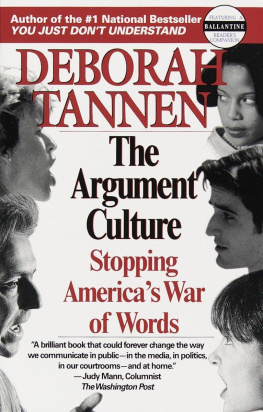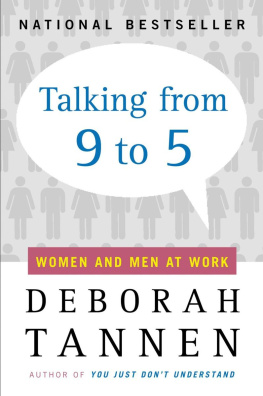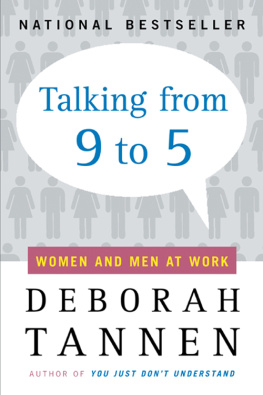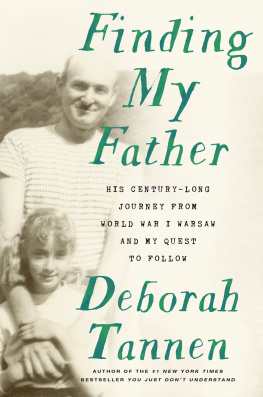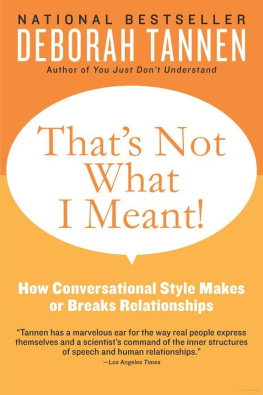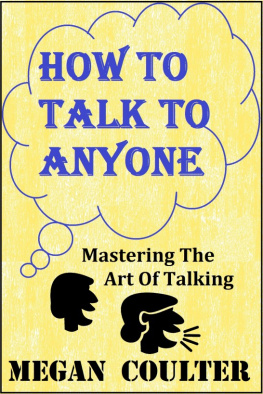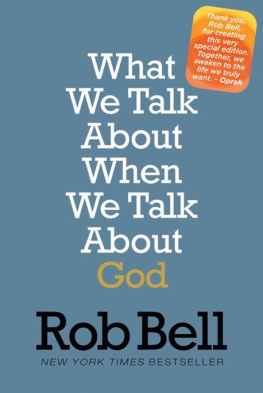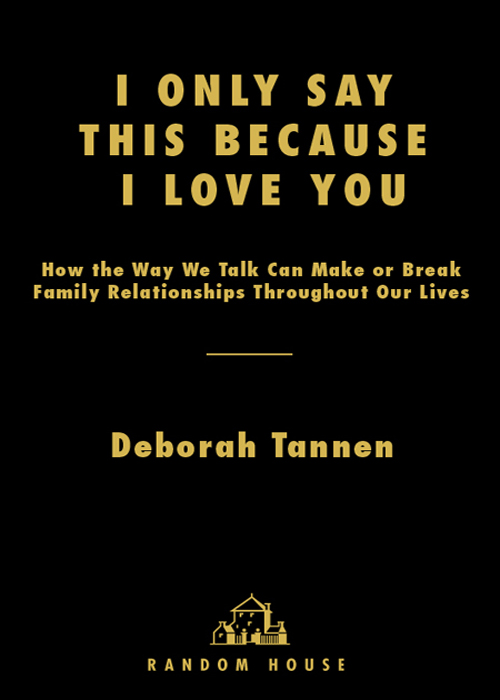E IGHT
Help MeGet out of My Way
Sisters and Brothers Forever
A WOMAN I KNOW asked me what I was writing about. Family communication, I said.
She seemed interested.
Especially adult families, I added.
Oh, yes, she warmed up. Like dealing with aging parents. Thats good.
More like adult siblings, actually, I clarified.
Oh Lord! she exploded with emotion and energy. Now youre on it! And she followed up with a ten-minute diatribe detailing her frustrations with her sister and brother.
There are few relationships as closeor as hierarchicalas the relationship between siblings. The closeness is reflected in the way we use the words: Hes like a brother to me, Were like sisters, meaning, We are completely comfortable in each others company; we know everything about each other; we love each other that much.
Having grown up together, having been there from the beginning, is what makes siblings close: They shared their childhoods. For example, in a story by , when the narrator needs someone to talk to about her boyfriend, she immediately thinks of her sister Tina: I had gotten into several quarrels with Gene on the car ride back, and I couldnt tell how serious they were and I wanted to call Tina right away to ask her opinion. For women especially, a sister is a built-in buddy, ready for rapport-talk conversations by which to work out how they feel about people and events in their lives.
Yet there is also no relationship as hierarchical as the one between siblings. In many languages there are no words simply for sister and brother. There are only words that reflect siblings relative agesand hence relative status. For example, in Sinhala, the language of Sri Lanka, a younger brother is malli, an older brother is ayiya, a younger sister is nanggi, and an older sister is akka. In Chinese families siblings address each other not by name but by titles that reflect the order of their birth: Third Eldest Brother, Fifth Younger Sister, and so on. This naming system puts into words the sense of where you are in the sibling hierarchy that pervades brothers and sisters relationships long after they are grown.
Even siblings of the same agetwinscan vie with each other over whos best and whos right. Keith did not have a twin brother, but he discovered this pattern in his friend Jesse, who did. Keith felt so comfortable with Jesse that he invited him to join his family for a week on their sailboat, which Keith himself captained. In this context Keith saw a new side of his friend: Jesse found fault with everything Keith did and started doling out small mocking jabs, little verbal rebellions. On the sailboat, where everyones life was in Keiths hands, the behavior was not just irritating but downright scary. Sensing he was rattling his friend, Jesse said, with chagrin, Im treating you the way I treat my twin brother.
Several aspects of the setting could have brought out the competition: the family context, the audience of other relatives, and the hierarchy inherent in Keith being captain and Jesse a member of the crew. Whatever brought it out, treating his friend like a twin brother meant moving farther from the equality end of the continuum, more toward the hierarchy end.
Sisters and brothers are born into the same family, but its a different family when each is born. Parents are first-time parents or experienced parents; live in different homes or different circumstances; have more money or less moneyand if there are older siblings or stepsiblings, that, too, makes the family completely different. Illness or death, of a parent or child, also changes the family irrevocably, in different ways for different children. Parents speak differently to girls than they do to boys, and they speak differently to older siblings than to younger ones; older or younger siblings learn different ways of talking within the family; and these patterns of speaking take hold, influencing both how we speak and how we react when others speak for the rest of our lives.
Looking more closely at sisters and brothershow the sibling relationship persists and develops into adulthoodsheds light on the interplay of connection and hierarchy that drives all family talk and family relationships.
B IRTH O RDER F OREVER
, You know, Sadie doesnt approve of me sometimes. She frowns at me in her big-sister sort of way. Bessie was 101 when she said this, and Sadie was 103. The Delany sisters were immutably older and younger, those two small years between them so powerful that the gap continued to shape their relationship after they had both lived an entire century.
, in his memoir Phoenix, describes how he and his adult sistersall older than hecontinue to take the roles they learned as children in their dealings with each other. For example, having returned home for their fathers funeral, they all accompany their mother to the funeral parlor, where she must choose a casket:
Joanne, the oldest, led Mom from casket to casket, and they talked quietly, sometimes turning to ask a question....
June drifted around the showroom like an unmoored boat.
Janice stared at one of the top-end caskets and twirled a strand of dark brown hair around her finger....
Joanne, the oldest, was in place beside Mom, helping her make the decision. That left the other two sisters unmoored, freed from the task but also adrift, since they werent needed. And unneeded is just one step from excluded:
We all went back into the funeral directors little office, where Joanne took the lead and started going through some of the practical matters of the burial (And the difference between the two caskets is, this ones waterproof?), weighing the costs and the options. June just sat there in high-idle, smoking a cigarette, and only once interjected a semihostile question (Which casket is waterproof?), as if wed been trying to exclude her from the process.
Years later the siblings sadly gather again when Dolans older brother is grievously (it turns out fatally) burned in an explosion. The author and his sisters, along with their mother, keep a two-week vigil at the hospital as his brothers condition worsens. Once again Dolan describes how each plays the role assigned by the order of birth:
At times it did seem as if this catastrophe had reduced us to ourselves, as if we really did live inside the petty roles of childhoodJoanne the big sister, the peacemaker; Janice the middle child, with a middle childs resentment; June the youngest girl, her navet transformed into disappointment; and me the baby, who would rather be done with it quickly, then go outside and playor, in this case, drive.
Despite these starkly different ways of dealing with their brothers devastating injury, the four siblings, with their mother, all gather at the hospital and keep vigil there until their brother John dies. Though the patterns formed by the order of their birth (and, of course, their individual personalities) created frustrations at this terrible time, they nonetheless faced the loss together, as a family.


